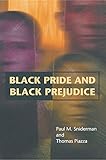Black Pride and Black Prejudice / Paul M. Sniderman, Thomas Piazza.
Material type: TextPublisher: Princeton, NJ : Princeton University Press, [2021]Copyright date: ©2002Description: 1 online resource (233 p.) : 25 line illus. 21 tablesContent type:
TextPublisher: Princeton, NJ : Princeton University Press, [2021]Copyright date: ©2002Description: 1 online resource (233 p.) : 25 line illus. 21 tablesContent type: - 9780691225616
- African Americans -- Attitudes
- African Americans -- Race identity
- Prejudices -- United States
- SOCIAL SCIENCE / Discrimination & Race Relations
- Adler, Marc
- Afrocentricity
- Anti-Defamation League
- Aristotle
- Berlin, Isaiah
- Black Panther Movement
- Bobo, Lawrence
- Churchill, Winston
- Cokely, Steve
- Combs, Michael
- Converse, Philip
- Davis, Darren
- Dawson, Michael C
- Equal Opportunity experiment
- Garvey, Marcus
- Gilens, Martin
- Glazer, Nathan
- Herring, Mary
- Hofstadter, Richard
- Hutchings, Vincent
- Index of Conspiratorial Thinking
- Jackson, Jesse
- Jankowski, Thomas B
- Jeffries, Leonard
- Karenga, Ron
- Kennedy, John F
- Lepkowski, James M
- Marable, Manning
- McWhorter, John
- Muhammad, Elijah
- Muhammed, Khalid
- Newton, Huey
- Oswald, Lee Harvey
- Redistricting experiment
- Reed, Adolph
- Sawyer, Eugene
- Selznick, Gertrude
- Sigelman, Lee
- Steinberg, Stephen
- Tate, Katherine
- Taylor, Charles
- Turner, Patricia
- Welch, Susan
- West, Cornell
- Williams, Anthony
- Wright, Richard
- black studies programs
- ethnocentrism
- prejudice: black
- racism, charges of
- 305.896/073 21
- E185.625 .S65 2002
- online - DeGruyter
| Item type | Current library | Call number | URL | Status | Notes | Barcode | |
|---|---|---|---|---|---|---|---|
 eBook
eBook
|
Biblioteca "Angelicum" Pont. Univ. S.Tommaso d'Aquino Nuvola online | online - DeGruyter (Browse shelf(Opens below)) | Online access | Not for loan (Accesso limitato) | Accesso per gli utenti autorizzati / Access for authorized users | (dgr)9780691225616 |
Browsing Biblioteca "Angelicum" Pont. Univ. S.Tommaso d'Aquino shelves, Shelving location: Nuvola online Close shelf browser (Hides shelf browser)

|

|

|

|

|

|

|
||
| online - DeGruyter Sexual Identities, Queer Politics / | online - DeGruyter The Renewal of the Priesthood : Modernity and Traditionalism in a South Indian Temple / | online - DeGruyter The Underwater Eye : How the Movie Camera Opened the Depths and Unleashed New Realms of Fantasy / | online - DeGruyter Black Pride and Black Prejudice / | online - DeGruyter The Politics of Economic Leadership : The Causes and Consequences of Presidential Rhetoric / | online - DeGruyter Services and Employment : Explaining the U.S.-European Gap / | online - DeGruyter Chinese Primer : Character Workbook (GR) / |
Frontmatter -- Contents -- List of Figures -- List of Tables -- Preface -- 1 Introduction -- 2 Racial Solidarity -- 3 Conflict -- 4 Common Ground -- 5 Conclusion -- Appendix A SAMPLING AND WEIGHTING -- Appendix B QUESTIONNAIRE FOR THE CHICAGO SURVEY -- Bibliography -- Index
restricted access online access with authorization star
http://purl.org/coar/access_right/c_16ec
Do "black pride" and "black prejudice" come hand in hand? Does taking pride in being black encourage the rejection of a common bond with other Americans? In this groundbreaking study, two leading social scientists mount a challenge to those who would answer "yes." Paul Sniderman and Thomas Piazza probe these questions in the only way possible--asking black Americans themselves to share their thoughts about each other, America, and other Americans. Writing in a strikingly transparent style, they open a new window on the ideas and values of real individuals who make up the black community in America today. Contrary to the rhetoric of some black leaders, Sniderman and Piazza show that African Americans overwhelmingly reject racial separatism and embrace a common framework, culture, and identity with other Americans. Although the authors find that levels of anti-Semitism are notably higher among black Americans than among white Americans, they demonstrate that taking pride in being black does not encourage blacks to be more suspicious or intolerant of others who are not black. The higher levels of anti-Semitism are instead associated with a gallery of oversimplified and accusatory ideas, including a popularized Afrocentrism and charges of vast conspiracies, that have won substantial support in the black community. Readers of this book will come away with an understanding of how African Americans, while insistent on winning racial justice, are deeply committed to the values of the American ethos and their identity as Americans.
Mode of access: Internet via World Wide Web.
In English.
Description based on online resource; title from PDF title page (publisher's Web site, viewed 29. Jul 2021)


